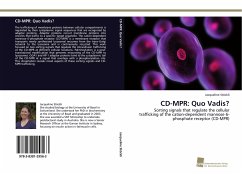The trafficking of membrane proteins between cellular compartments is regulated by their cytoplasmic signal sequences that are recognised by adaptor proteins. Adaptor proteins recruit membrane proteins into vesicles that traffic to a specific target organelle. The cation-dependent mannose 6-phosphate receptor (CD-MPR) is a membrane receptor that transports newly synthesised lysosomal enzymes from the trans-Golgi network to the lysosome and is continuously recycled. This work focused on two sorting signals that regulate the intracellular trafficking of the CD-MPR at different cellular locations. Palmitoylation is a post-translational modification that prevents missorting of the CD-MPR to lysosomes. GGA1 and AP-1 adaptor proteins bind to the cytoplasmic tail of the CD-MPR at a signal that overlaps with a phosphorylation site. This dissertation reveals novel aspects of these sorting signals and CD-MPR trafficking.
Bitte wählen Sie Ihr Anliegen aus.
Rechnungen
Retourenschein anfordern
Bestellstatus
Storno








